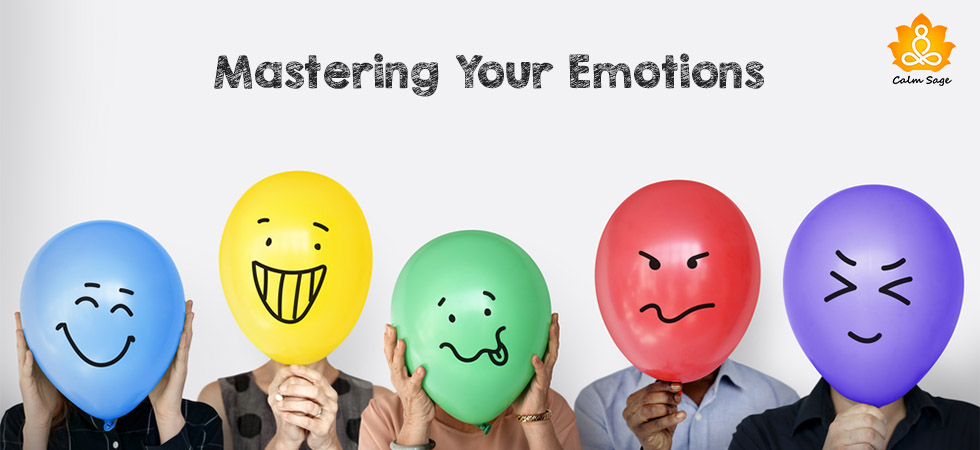Mastering Your Emotions: 11 Steps On How To Control Your Emotions

Have you ever felt as if your anger was driving you to act on something? Ever felt as if your emotions were controlling you? Do you lose the ability to think rationally when in situations that require logic, not emotions?
These all might be signs that you need to control your emotions and build your emotional intelligence.
Sometimes, our emotions seem to override our rational side and make us do or say things that we might regret later. Learning how to control emotions not only helps maintain the emotional quotient but can also help balance your rational and emotional side.
In this article, I’ll help you understand why our emotions matter and how you can control your emotions.
Why Emotions Matter?

Emotions are an integral part of our psychological development. Emotions are what make us feel, improve communication, and build strong relationships – professionally and personally. Even negative emotions such as anger, frustration, irritation, and sadness are important. When we learn to balance negative emotions, we can better experience the positive ones.
Mastering our emotions, balancing the unpleasant emotions and the pleasant ones can help us experience the feelings they bring forth in a new light, a better light.
This ability to express emotions is very important as emotions are responsible for our subsequent reactions. Being in tune with your emotions can help you with:
- Better decision-making
- Maintaining relationships
- Professional and social interactions
- Self-awareness
While emotions are important, they can take a heavy toll on your emotional health if they become out of control. I have compiled some ways you can learn to take back control of your emotions if and when they go out of control.
How To Control My Emotions in a Healthy Way?
1. Examine The Impact
Emotions are good for us but sometimes they can become overwhelming and can create problems. When do emotions become problematic, though?
When you don’t have control over your emotions, it can lead to:
- Conflicts at work and home
- Difficulty in connecting with others
- Using substances to feel in control
- Emotional breakdown
- Physical outbursts
Consider what impact your emotions are causing in your life. Once you’ve identified that, you’ll be able to control your emotions a little better.
2. Regulate, Don’t Repress
Control, don’t repress your emotions. When you suppress your emotions or repress them, you prevent yourself from fully experiencing them. If you continue to repress and bottle them up, two things can happen; either you’ll grow numb to your emotions or you’ll explode when least expected.
Repressing emotions can also lead you to develop issues such as:
- Anxiety
- Depression
- Sleep disorders
- Muscle aches
- Chronic stress
- Addiction
3. Put A Name To It

Check-in with yourself whenever you feel out of control emotions-wise. As yourself:
- What am I feeling right at this moment?
- What caused me to feel this way?
- Is there a different explanation for the way I’m feeling?
- What can I do about my feelings?
- How can I cope with my feelings, right now?
By questioning and putting a name to your emotions, you are reframing your thoughts and feelings. In the beginning, it might be difficult but with practice, you can learn to better control emotions.
4. Accept Them
Accepting emotion is a big part of learning how to control emotions. Accepting them can make you feel more comfortable when they surface and once you’re comfortable with your emotions you can learn to feel them without losing control. Accepting your emotions as they are – bad or good – can also help you increase your life satisfaction and happiness.
Read: RAIN- Mindfulness Tool to Deal With Your Overwhelming Emotions
5. Write In A Mood Journal
Keeping a track of your mood and emotions via a mood journal is also a wonderful way to control your emotions. It can help you understand your triggers and patterns. Once you’re aware of your triggers that are causing you to lose control of your emotions, you can learn to either avoid them or eliminate them.
6. Take Deep Breaths
I never believed in it until I tried it myself but taking deep breaths when your emotions are all over the place can help you take back control of your emotions. Next time you feel overwhelmed with emotions, take a deep breath and picture yourself in your happy place. It’ll help!
7. Express Them
Expressing your emotions instead of bottling them up is another way to control your emotions. For example: If you’re too angry or frustrated at something, you can try screaming into a pillow or if you’re sad, you can try to cry your feelings out.
Just remember to do so in a way that no one near you gets hurt. Screaming at someone you care about is probably not a good idea to express your feelings of frustration or anger.
8. Take A Break

Sometimes emotions can become too overwhelming and can make us act out of character. To avoid exploding and snapping at others, you can try taking a break from your situation. Sometimes putting some distance between the situations causing you to feel emotional can help.
You can try:
- Taking a walk
- Watching a movie
- Listening to music
- Talking to a friend
- Cuddling with your pet
9. Meditate On It
Meditation is one of the best ways to increase self-awareness and control thoughts and feelings. Meditation can also help in understanding why your emotions are unbalanced and out of control. Meditating can help you take back control of your errant thoughts and feelings and regulate your emotional process. Plus, it helps in improving concentration and better sleep.
10. Learn Stress Management
When a person is under too much stress, controlling emotions can be difficult and challenging. Learning effective stress management techniques can help you regain control of your emotions. Mindfulness practices can help a lot. You can also try:
- Getting enough sleep
- Staying in touch with your friends and family
- Exercising regularly
- Spending time in nature
- Engaging in hobbies
11. Talk To A Professional
Sometimes emotions can become too overwhelming to be controlled on your own. In such cases, it is always recommended to seek help from a professional counselor. If you have an underlying mental health problem such as mood disorders, personality disorders, or such, please contact your therapist if you’re having trouble controlling your emotions.
Severe mood swings, repressed emotions, or not expressing your emotions the right way can cause you to feel hopeless and may trigger self-harming tendencies.
You can always reach out to us at info@calmsage.com or connect with us on our social media pages if you need to understand more about how to control your emotions.
We are always here to help you.
Stay happy, stay safe!





















This learning is really good